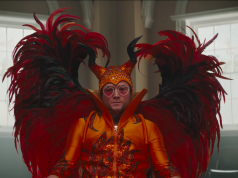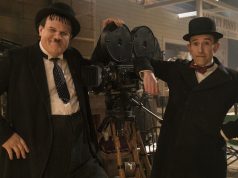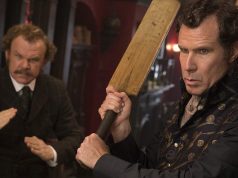It takes a smart team to make a good spoof. This is evident in the many not-good spoofs that have polluted cineplexes in recent months, simple-minded exercises like “The Comebacks” and “Date Movie” that think referencing something is the same thing as spoofing it.
“Walk Hard” gets it. Written by Jake Kasdan and Judd Apatow and directed by Kasdan, it’s a parody of musical biopics, particularly “Walk the Line” and “Ray,” and it merrily deconstructs the conventions of the genre with subtlety and (where required) blatant outright mockery. When the legendary rock singer Dewey Cox (John C. Reilly) stands contemplatively in the shadows backstage before a performance and a crew member urges him to get ready, a band member explains: “Dewey Cox needs to think about his entire life before he plays.”
The rest of the film is a flashback, of course, starting with Dewey’s childhood in Arkansas in the 1940s. His brother Nate is a talented pianist and the favored son; as you know from seeing other biopics, Dewey is bound to be responsible, at least indirectly, for Nate’s death. In this case, it’s horseplay in the barn that leads to Dewey accidentally cutting Nate in half with a machete.
At age 14, Dewey — already being played by the very obviously 40-something John C. Reilly — performs rock ‘n’ roll at a school talent show, resulting in mayhem. A few years later he’s married to, and has an impossible number of children with, Edith (Kristen Wiig), who doesn’t support his dreams of being a musician. “I do believe in you!” she insists. “I just know you’re gonna fail.” He sweeps floors at a black nightclub where everyone dances erotically, and gets his big break when the regular singer/guitarist is injured.
His trajectory mostly follows Johnny Cash’s, notably in his falling in love with a backup singer named Darlene (Jenna Fischer) and eventually leaving his wife for her. He becomes a drug user, too, after being introduced to it by his drummer, Sam (Tim Meadows), who warns him against using marijuana … not very convincingly, since he also mentions that it has no side effects, isn’t addictive, and is the cheapest drug there is.
There are a lot of laughs in seeing Dewey go through the phases of a rock star whose career spans several decades. In the ’60s alone he has a Dylan-esque incomprehensible period and an LSD-fueled romp with the Beatles, who are played by Jack Black, Paul Rudd, Jason Schwartzman, and Justin Long in a scene that will either slay you with its ad-libbed silliness or leave you absolutely cold. Me, I cracked up, particularly at the constant declarations of “We’re the Beatles,” a jab at the tendency in fact-based movies to include self-conscious cameos by actors playing real people. Either way, there’s no denying Rudd’s John Lennon impersonation is simultaneously accurate and absurd.
That sums up the movie’s general attitude, actually: accurate and absurd. The record execs who guide Dewey’s career are Jewish, which is to be expected; to bring the point home, they’re dressed in ringlets, beards, and yarmulkes and have names like L’Chaim and Mazeltov.
Not every joke is a hit, and not every plot point strikes the right balance between being useful to progress the story and being funny. The songs are great, though, all robustly sung by Reilly and written so they sound like legitimate rock and country hits. Kasdan and Apatow were wise not to make the songs goofy, and Reilly and company are wise to play them with a straight face. That makes the double-entendre, when it appears, that much funnier.
Reilly has emerged in recent years as a surprisingly versatile performer, and much funnier than I’d have expected from his early appearances in films like “Boogie Nights” and “The Perfect Storm.” His performance here is clearly inspired by his association with Will Ferrell, right down to the obligatory moment where an unshaven and unkempt Dewey Cox runs around a city street in his underwear, but Reilly makes Dewey his own creation. Like Ferrell’s best characters, Dewey is two-dimensional and exists purely to make us laugh — but any fellow played by Reilly is bound to be kind of sweet, too, even in a film as staunchly anti-sentiment as this one.
B (1 hr., 36 min.; )





